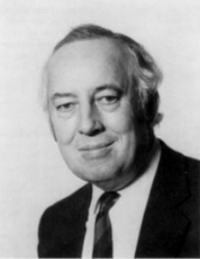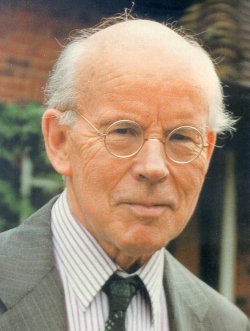
Sir John Peter Mills Tizard was a British paediatrician and professor at the University of Oxford. Tizard was principally notable for important research into neonatology and paediatric neurology and being a founder member of the Neonatal Society in 1959. Tizard was considered the most distinguished academic children's physician of his generation.
Victor Dubowitz is a British neurologist and professor emeritus at Imperial College London. He is principally known along with his wife Lilly Dubowitz for developing two clinical tests, the Dubowitz Score to estimate gestational age and the other for the systematic neurological examination of the newborn.
Douglas Montagu Temple Gairdner FRCP was a Scottish paediatrician, research scientist, academic and author. Gairdner was principally known for a number of research studies in neonatology at a time when that subject was being developed as perhaps the most rewarding application of basic physiology to patient care, and later his most important contributions as editor, firstly editing Recent Advances in Paediatrics, and then of Archives of Disease in Childhood for 15 years, turning the latter into an international journal of repute with its exemplary standards of content and presentation.

Herbert Barrie, was a British consultant paediatrician and a leading figure in neonatology. He was a pioneer in the emerging specialty of paediatrics and neonatal medicine; and he developed one of the first neonatal intensive care units in London.
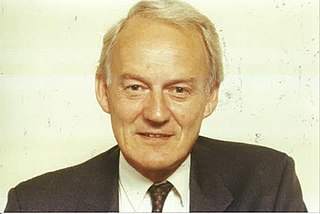
Sir David Hull was a British paediatrician. Hull was most notable for research and for a paper he published in 1963 in the Journal of Physiology with Michael Dawkins, about research into brown fat, an adipose-like tissue found in hibernating animals and in the human Infant and for later contributions considered outstanding in research conducted on Lipid metabolism and Thermoregulation.
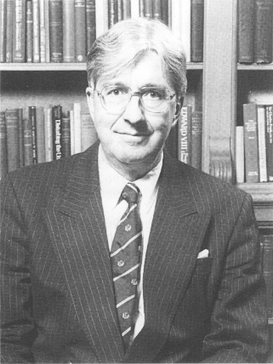
Edward Osmund Royle Reynolds, was a British paediatrician and Neonatologist who was most notable for the introduction of new techniques intended to improve the survival of newborns, especially those with respiratory failure, and for a series of papers regarding the value of techniques such as ultrasound imaging, nuclear magnetic resonance spectroscopy, and near infrared spectroscopy in determining the development and response to injury of the infant brain after birth.
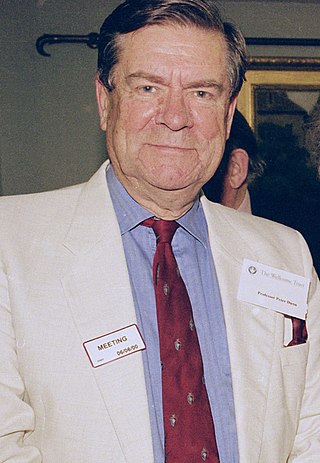
Peter MacNaughton Dunn was an English paediatrician. Dunn was most notable for introducing into the UK the Gregory box in 1971, that provides Continuous positive airway pressure in the treatment of infant respiratory distress syndrome of the newborn and conducting research into Hip dysplasia and fetal adaptation to extrauterine life. Dunn was also notable for being known for founding the charity association British Association of Perinatal Medicine.
Leonard Birnie Strang FRCP was a Scottish born, British professor of Paediatric sciences and was a Secretary of the Paediatric Committee of the Royal College of Physicians. He was considered an outstanding clinical observer, contributing to the first accounts of harlequinism and of catecholamine secretion in neuroblastoma. However it was his later work that Leonard Strang became famous, leading a team over two decades studying pulmonary vasculature in the perinatal period and even more the central role that secretion of lungs containing fluid plays in lung formation and preparation for birth.
James Spence Medal is a medal that was first struck in 1960, six years after the death of the paediatrician James Calvert Spence and is awarded for outstanding contributions to the advancement or clarification of paediatric knowledge and is the highest honour bestowed by The Royal College of Paediatrics and Child Health.
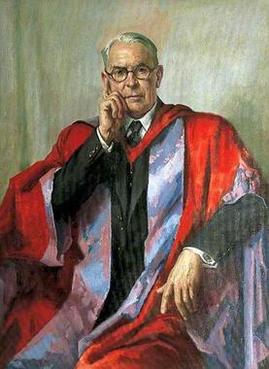
Sir Alan Aird Moncrieff, was a British paediatrician and professor emeritus at University of London. He was most notable for developing the first premature-baby unit in 1947. It was Moncrief who recognised and developed the concept of daily parental visits to the ward, which he developed while at Great Ormond Street, well before the need for this became recognised, and with his ward sister, published an article on Hospital Visiting for Children in 1949.

Seymour Donald Mayneord Court was a British paediatrician who was known for his achievements in the fields of respiratory disease and the epidemiology of disease in childhood. He was also known for working, in a primary role, that established the importance of research into the social and behavioural aspects of illness in childhood.

Sir Kenneth William Cross FRCP was a British physiologist who was principally known for his fundamental contributions to the physiology of newborns that are relevant to paediatric practice.
Forrester Cockburn is a British Paediatrician and emeritus professor at the University of Glasgow. Cockburn is most notable for conducting research into fetal/neonatal nutrition and brain biochemistry, inherited metabolic diseases and Pediatric ethics. Cockburn was awarded the prestigious James Spence Medal in 1998.
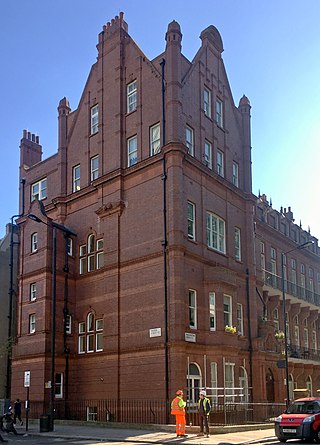
The Paddington Green Children's Hospital was a hospital in Paddington Green, London, that existed from 1883 to 1987. The former building is now grade II listed with Historic England.

David Robert Harvey was a British paediatrician and considered by his peers to be a champion of the less privileged. Harvey was most notable for developing the training of neonatal medicine doctors at a time when the speciality had no official recognition. Harvey was homosexual and never afraid to disclose it, even at the beginning of his career, when homophobia was more prominent.
Andrew Wilkinson is a British paediatrician who is a Professor Emeritus of Paediatrics and Perinatal Medicine at All Souls College, Oxford. Wilkinson is most notable for being an international authority in neonatology and a lead author of the Standards of Care for NICU and NICE guidelines on retinopathy of prematurity.
Anne Greenough is a British neonatologist and is most notable for research into clinical and academic neonatology through work relating to the origins, markers and management of chronic lung disease following preterm birth. Greenough is Professor of Neonatology and Clinical Respiratory Physiology at King's College London.
Neil McIntosh is a British and Scottish paediatrician and neonatologist who was most notable for being the leading writer of a pivotal article that defined standards of ethical behaviour in paediatrics, including withdrawal of newborn intensive care. McIntosh is emeritus professor of Neonatology and Child Life and Health at the University of Edinburgh. During McIntosh's career he has researched mineral metabolism in preterm infants, computerised acquisition of physiological data in Neonatal Intensive Care Nursing.
Thomas Stapleton FRCP (Lond), FRACP, FRCPCH (1920-2007) was a British paediatrician who worked in Australia.
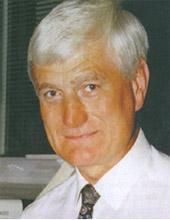
Henry Lewis Halliday was a British-Irish paediatrician and neonatologist. In 2021, Halliday was awarded the James Spence Medal for research into neonatology, for coordinating two of the largest neonatal multicentre trials for prevention and treatment of a number of neonatal respiratory illnesses and for a breakthrough in the development of a new lung surfactant that brought relief to very small babies suffering from infant respiratory distress syndrome (RDS).
